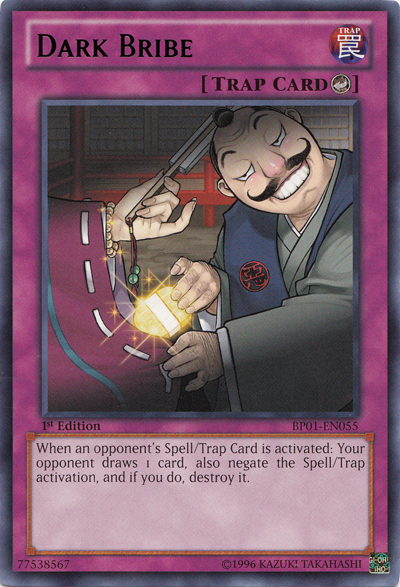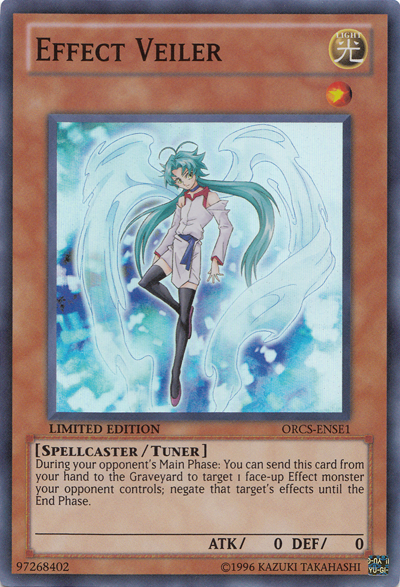Theoretical Card Advantage
Theoretical Card Advantage is an interesting concept which elaborates further from your standard Card Advantage. Essentially, the concept behind it is that sometimes it is in your best interests to use cards that may put you at a negative Card Advantage, but end up reaching the same or a better situation in terms of what you have over your opponent.
To go into more depth on this subject, I must first explain what Card Advantage is. Card Advantage, or CA, is essentially the number of cards you have compared to your opponent. It can be altered by your opponent losing or gaining cards, or by you losing or gaining cards. As more specific terms, there are Field Advantage and Hand Advantage, which are crucial elements of swarm and hand control decks. When a card effect or combination of effects would have you gain or lose more cards than you have used, this would be called a +/-#, and the change is the opposite for the opponent as from their perspective, when the amount of cards in your hand changes, the amount they have more or less than you also changes.
Now, Theoretical Card Advantage is a little less straightforward. Essentially, it is based around what your opponent could theoretically get from doing something, and stopping it from happening. For example, when your opponent activates Pot of Avarice, which draws 2 cards (making it a +1), you could activate Solemn Judgment and negate it. This would be viewed as no change in Card Advantage, however from a theoretical point of view you are +1 over what you would have been at.
This kind of logic is what makes certain cards viable for use in different situations. I shall list and explain a few of such cards.
Dark Bribe :

This card can negate any Spell or Trap your opponent uses, but makes them draw a card. This effect is a -1 in Card Advantage, but can often prove to be very useful in negating cards that would otherwise put you in worse situations. The card can also be used in Mill decks due to its nature of helping your opponent to deck out.
Chain Disappearance :

This card is great in terms of what it beats. A vast number of monsters with 1000 or less attack have effects that increase Card Advantage. Examples of cards this card beats are TGU, which is a +1, Rescue Rabbit, which can be viewed as a +1 but theoretically has no effect on card advantage due to forcing the player to overlay into an Xyz, and even cards from less-used archetypes, such as Wattcobra, which gives a +1 whenever it attacks. This card is good for Theoretical Card Advantage because it is good at stopping those +1s your opponent would get, and therefore it is generically a theoretical +1.
Effect Veiler :

Has it ever occurred to you that Effect Veiler is technically a -1, and will always be that way? The manner in which it stops effect monsters from functioning and shuts down cards like Cardcar D in a complete fashion can devastate in terms of TCA, but in CA it shall always be a -1.
After looking into Theoretical Card Advantage, you can also see ways in which you can completely dominate over your opponent’s strategy while preventing them from stopping yours. All you have to do is look at what kind of CA different effects and combinations that they use tend to give, and from this work out what you need to do to prevent them in a manner which does not cost you any more cards than it should. An example of this kind of play is something you could try against Fire Fists. Cursed Seal of the Forbidden Spell is a card you very rarely see in the current format, as it is a -1 in CA and it can only negate Spell cards. However, against Fire Fists, it would be worth stopping Fire Formation: Tenki, which is a +1, as theoretically you reach no effect on CA from what would have happened had you let your opponent go through with the move. Then, because of the Trap’s separate effect, you would be able to stop your opponent’s main search card from being used, thus lowering their consistency vastly for the duel in question.
This alternate way of viewing Card Advantage can help you to decide when you need to play cards that might not give you a favourable CA, but can stop your opponent from generating it anyway. The essential point that this article is trying to bring across is that you should not make plays only when it would put things in your favour in terms of generating advantage of some form, but instead you can also look at what your opponent is going to get if you let them go through with something. Every good deck has some means of gaining in CA, so it isn’t always a bad thing to lose a bit to prevent your opponent from getting the same boost anyway. It is notable that there are two sides to losing CA, which are your opponent gaining cards, and you losing cards. Sometimes, even if the end result will be the same whether you do something or not, it is better for you to control the situation and make it the one rather than the other, seeing as your opponent may be trying to set something up and stopping them from getting certain cards may be the key to preventing an OTK.
Another thing you could take into account with Theoretical Card Advantage is what you actually get by doing certain moves. While Thunder Dragon’s effect gives you a +1, you can’t really do anything with 2 Thunder Dragons other than use them as discard fodder. It is always a good idea to keep track of what cards your opponent has in their hand from what you know through searches and possibly even cards like Mind Crush. By doing this, you can see what your opponent is setting up, and potentially limit how they go about doing so. A big example with this is Exodia decks. If you know your opponent’s hand contains 2 Thunder Dragons and 5 unknown cards, your first reaction should be to work out that they must have 4 or less Exodia pieces. On that note, if they played Pot of Avarice, then it would probably be a good idea to negate it somehow, as if they did have 4 Exodia pieces then then all that would remain would be a completely dead hand. However, if you knew they had no Exodia pieces due to a Mind Crush you had played earlier, then you could leave it be as they may have something that needs to be negated more than a straight +1 that could well lower the consistency of what they already have slightly.
In conclusion, it is a good idea to think more about what your opponent is actually going to do with certain cards or combinations, and decide whether or not you wish to negate them. This kind of element is crucial to any control deck, and is a gameplay element that should never be written off for simplicity or simply be ignored for purposes of generating stronger Card Advantage, or keeping hold of more responses.

